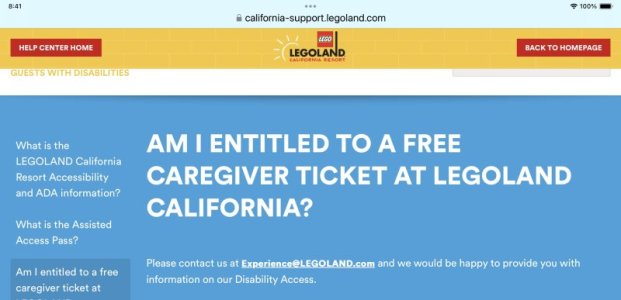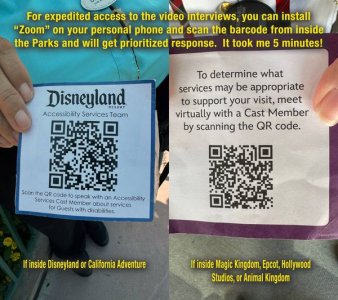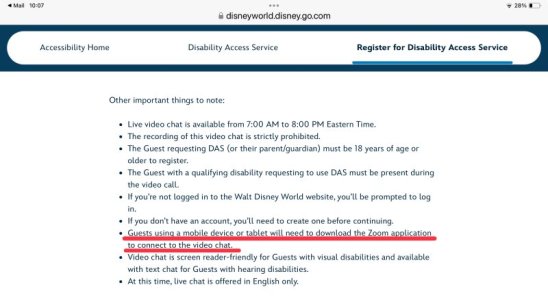SueM in MN
combining the teacups with a roller coaster
- Joined
- Aug 23, 1999
- Messages
- 36,350
ADA does callout A companion to had with accommodations.
CaregiverDoes the ADA call out a companion, or a caregiver?
Don't know the letter of the law; most places that I see designate it as companion.
A theater could choose to give a free companion ticket, but it's their choice, not a requirement.This is a good read on caregivers/companions, and I learned some new things from reading it: https://adata.org/factsheet/ada-and-caregivers
Notice how vague a lot of the wording is. Some things have rules, others suggestions, and there's a lot of wiggle room with all these topics.
Personally, I see the term companion used when buying movie or sports tickets. The theater I go to allows a free companion ticket for someone with a disability; sporting events don't.
This is a screenshot from the LEGOLAND website. It was the only information I could find.Legoland, SeaWorld, and SD zoo all give complimentary entrance for companions.....looking at you Disney.

SeaWorld doesn't have search on their Orlando or San Diego websites. I couldn't find anything about discounts for disability or caregivers. The Orlando one USED TO give discounts to guests with wheelchairs who couldn't transfer because most of their attractions were not accessible. I couldn't find that on their website now.
I copied this from post I made Wednesday on this thread. Reposting because it's about 5 pages back.From the approval/denial thread.
I don't see anywhere where it refers to a companion as just a companion - it apparently refers to caregivers only.
I am quite sure no where gives free admission to straight up companions for any & all disabled persons. Having a disability does not confer a right to have a friend accompany you free wherever you go. A necessary caregiver is a different story.
Given all the conversation about allowing the whole group to wait in line, I thought it would be a good idea to see what the ADA has to say about accommodating people with disabilities and their Caregivers.
Link to Factsheet The ADA and Caregivers. It's from the ADA National Network, which gives Information, Guidance and Training on the Americans with Disabilities Act.
Copied from website (my bold):
"How is the ADA relevant to caregivers and individuals with disabilities who need their assistance and support?
State and local government agencies (called “public entities”) and private businesses like stores, restaurants, movie theaters, amusements parks, etc. (called “places of public accommodation”) need to do a number of things to make sure people with disabilities can access goods and services, including:
- Provide aids and services to communicate effectively with individuals who have hearing, vision, or speech disabilities (e.g., read labels or tags aloud, describe items, provide materials in large print, Braille, or electronic formats for individuals who are blind or have low vision; exchange written notes, provide assistive listening devices, sign language interpreters, or captioning services for individuals who are deaf or hard of hearing);
- Make “reasonable modifications in policies, practices, or procedures” to ensure equal opportunities.
- This means public entities or businesses may need to do things a little differently or adjust rules, on an individual, case-by-case basis, so that a person with a disability can access services or participate in programs. This may include accommodating a caregiver who is providing assistance to a person with a disability.



